"The whole Russian front was falling apart ..." Wehrmacht breakthrough in the southern strategic direction
The disaster near Kharkov had far-reaching consequences. The troops of the Soviet South-Western and Southern fronts were greatly weakened, and strategic reserves were concentrated in the central direction. Having liquidated the Barvenkovsky protrusion of the Soviet troops, the enemy took advantageous starting positions for the deployment of a further offensive. Developing success, the German troops 10 — 26 June conducted two private offensive operations — on the Lupus and Kupian sectors, forcing the Soviet troops to retreat beyond the Oskol River.
Thus, the Wehrmacht was able to achieve a change in the balance of power on the southern wing of the Soviet-German front. The Commander-in-Chief, JV Stalin, in his address to the Military Council of the South-Western Front 26 in June 1942, noted that the Kharkiv operation ended in a catastrophe in the entire South-West Front. By its negative results, he compared this catastrophe with the tragedy of Samsonov’s army in the First World War (East Prussian operation 1914). Stressing responsibility for the mistakes of Tymoshenko, Khrushchev and Baghramian, all members of the Military Council, the Supreme noted: “If we told the country in its entirety about that catastrophe - with the loss of the 18-20 divisions that the front survived and continues to experience, I’m afraid that you would be very cool. Therefore, you should take into account the mistakes you have made and take all measures to ensure that they will not take place in the future. ”
Major defeats in the Crimea and near Kharkov contributed to the further success of the German troops and their breakthrough to the Volga at Stalingrad and the invasion of the Caucasus. The reasons for this tragedy were as objective (the preservation of the Wehrmacht’s overall advantage in combat), as well as subjective (the Soviet General Headquarters and the General Staff erred in the direction of the main attack of the enemy, the command of the southern wing of the Soviet front made a number of major mistakes and miscalculations). The Germans then had the most efficient army on the planet and did not forgive mistakes. The severe and cruel experience of the war helped the Red Army to master the art of war, raising its level to an amazing height. This complex process encompassed all links of command cadres.
Former German general and military historian Kurt Tippelskirkh, about the operation near Kharkov and its influence on further events at the front, wrote: “For the planned German offensive, the attempt of the Russians to prevent him was only a welcome start. The weakening of the defensive power of the Russians, which was not so easy to achieve, was to make the first operations much easier. But additional preparations were needed, which took almost a whole month before the German armies, having regrouped and filled everything they needed, were able to launch an offensive. ”
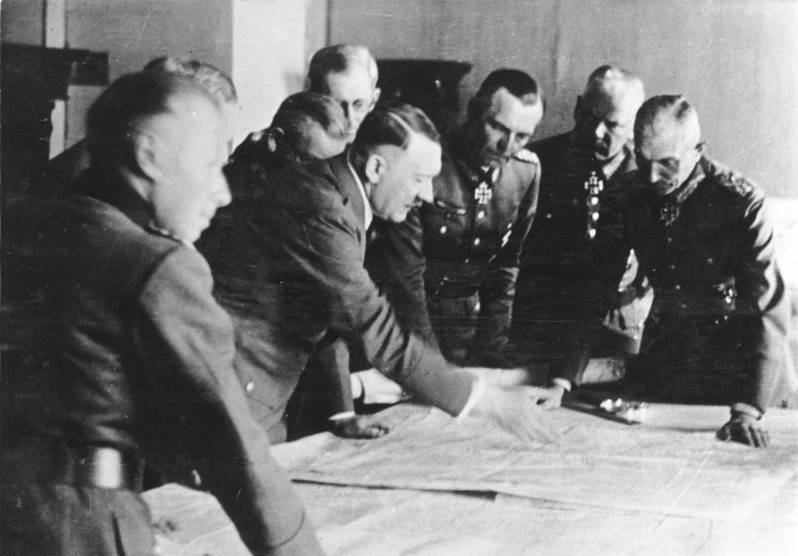
June 1942 g. Headquarters Army Group "South" in Poltava
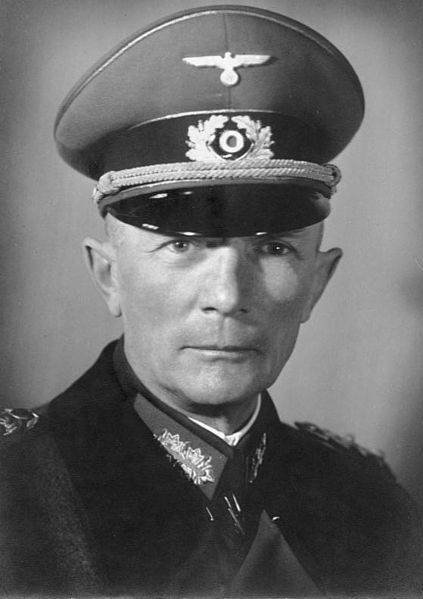
Army Group Commander Yug Fedor von Bock
In early June, the German command developed plans for offensive operations in the Voronezh and Kantemirov directions. With these operations, the planned decisive offensive of the 1942 summer campaign was to begin. The Wehrmacht was preparing a breakthrough to Voronezh by delivering two blows in converging directions: from the region northeast of Kursk to Voronezh, from the Volchansk region to Ostrogozhsk. In the course of this offensive operation, the enemy was going to destroy the Soviet troops defending in the Voronezh area, reach the Don from Voronezh to Novaya Kalitva, and seize the bridgehead on the left bank of the Don. After entering the Voronezh region, the German mobile units were to turn south along the Don, striking in the direction of Kantemirovka to the rear of the troops of the South-Western Front. At the same time, the German grouping concentrated around Slavyansk, Artyomovsk, Kramatorsk, had to make a breakthrough at the junction of the South-Western and Southern Fronts and, developing a strike on Kantemirovka, complete the encirclement of the main forces of the South-Western Front, developing success in the direction of Stalingrad and the North Caucasus .
Preparing the offensive in a southwestern direction, the German high command divided Army Group South into Army Group A under the command of Field Marshal Wilhelm List as part of the 1st tank, 17th and 11th field and 8th Italian armies (these troops were supposed to strike in the Caucasus), and Army Group B under the command of Field Marshal von Bock as part of the 4th Panzer, 2nd and 6th 2nd field and 1942nd Hungarian armies. By the end of June 900, the Germans concentrated in the strip from Kursk to Taganrog about 1260 thousand soldiers, 17 tanks, over 1640 thousand guns and mortars, 37 aircraft. This group included up to 50% of infantry and cavalry, more than XNUMX% of the armored forces of the German army, which were on the Eastern Front. Strong Wehrmacht strike groups were concentrated east of Kursk, northeast of Kharkov and the Donbass. Hitler’s headquarters from East Prussia was moved to Little Russia (Ukraine), in the Vinnitsa region.
The troops of the three Soviet fronts — Bryansk, South-Western and Southern (lieutenant-general F.I. Golikov, Marshal S.K. Timoshenko and lieutenant-general R. Ya. Malinovsky) defended against the enemy troops. Our troops were not inferior to the enemy in manpower and tanks, but were weaker in aircraft and artillery. In addition, the Soviet troops after heavy losses in the Crimea and in the Kharkiv region have not yet managed to recover, put themselves in order and gain a foothold in the new defensive lines. There were no large reserves. Those reserves that were in this area were mainly used during the heavy May and June battles. Especially a great advantage the enemy has created on the direction of the main attacks.
The Germans failed to complete the concentration of forces of the shock groups precisely at the scheduled time. The offensive in the Voronezh direction, originally scheduled for June 15, was postponed to 18, then to June 27, and then another day. On June 28, 1942, large enemy forces (2nd Field and 4th Tank German and 2nd Hungarian Army), combined into the Weichs army group, after the artillery and aviation preparations, went on the offensive against the troops of the left wing of the Bryansk Front. The main forces of the German strike group struck north of the Kursk-Voronezh railway. In the first echelon, 7 infantry, 3 tank, and 3 motorized divisions advanced. Ground forces supported aircraft of the 4th Air fleet.
In the direction of the main attack, two rifle divisions of the 13 Army, Major General N. P. Pukhov, and one division of the 40 Army, Lieutenant General M. A. Parsegov, defended themselves in the first echelon. Under the onslaught of superior enemy forces, our troops could not stand it, the Germans broke through the Soviet defenses and by the end of 2, the enemy’s tanks reached the Kastornoye - Stary Oskol railway line. To the south, German troops also achieved success. June 30, the shock group of the 6 of the German army, launched an offensive from the Volchansk area on Ostrogozhsk, and broke through the defenses of the 21 army by Major General V. N. Gordov and the 28 Army DI Ryabyshev of the right wing of the South-Western Front . Thus, taking advantage of the forces, especially in tanks, artillery and aircraft, the Germans broke through the defenses, both on the left wing of the Bryansk Front and on the right wing of the South-Western Front. German troops moved in the general direction of Voronezh and Stary Oskol.
“By the end of 2 July, the situation in the Voronezh direction had deteriorated sharply. The defense at the junction of the Bryansk and Southwestern Fronts was broken through to a depth of 80 km. The reserves of the front, available in this direction, were drawn into battle. There was a clear threat of a breakthrough of the enemy’s attack force to the Don River and the seizure of Voronezh by it, - wrote A. M. Vasilevsky. - In order to prevent the enemy from forcing the Don and to stop further advancement of his troops, the General Headquarters transferred two combined-arms armies to the commander of the Bryansk Front from its reserve, ordering them to deploy on the right bank of the Don in the Zadonsk, Pavlovsk sector. At the same time, the 5-I tank army was handed over to the front for it to inflict a counterstrike along the flank and rear of the group of German fascist troops, attacking Voronezh, along with the tank formations. ”
On the night of July 3, the corps of the 5 Tank Army commanded by A.I. Lizyukov concentrated in the area south of Yelets. The immediate tank attack on the flank and rear of the German mobile units could change the situation in our favor, especially since the Germans had already suffered losses, were tied up by battles and their troops were stretched at a considerable distance. However, during the 3 July, the Soviet Panzer Army received no tasks from the front command. The next day, A. M. Vasilevsky personally did it. The army received an order to intercept the communications of the enemy’s tank group that had broken through to the Don River to Voronezh by a strike in the general direction of Zemlyansk, Khokhol (35 km south-west of Voronezh); actions on the rear of this group to disrupt its crossing over the Don. " However, the 5-I tank army did not fulfill the task assigned to it.
As A. M. Vasilevsky wrote: “The reasons for this were the unsatisfactory organization of the army entering the battle from the army command and the lack of necessary assistance to it from the front means of reinforcement: artillery and aircraft; poor control of tank corps; the extremely weak help and unsatisfactory command and control of the army by the front staff ”.
Modern researchers note that there was little time to prepare and organize a counterattack. Lizyukov was a brave commander who had previously been noted in a number of battles, but did not have enough experience in commanding a large tank group, so the army could not achieve a simultaneous powerful attack by all units. By the time the operation began, only the 7 tank corps of P. A. Rotmistrov assigned to Lizyukov was located from the entire army near the area of forthcoming actions, and he did not have time to concentrate in the source area on time. As a result, the 7 tank corps entered the battle, unable to reconnoiter and concentrate fully. In addition, the entire counterstrike of the 5 Tank Army was based on the initially incorrect assumption that the advancing German tank corps would continue to move east through the Don and Voronezh. However, on July 5, the Army Group Weichs was ordered to release the mobile units of the German 4 Tank Army in the Voronezh region and move them south according to the Blau plan. And 24-th German tank corps was deployed by the command of the army group "Weichs" to the north to cover the main grouping of the 4-th tank army from the north, and so he entered into a counter battle with advancing to the south by the advanced parts of the Soviet 5-th tank army , timely revealing the intentions and anticipating them on the march.
As a result, the Soviet 5-I tank army was advancing "blindly" without intelligence, and, running into the large forces of the enemy, suffered heavy losses. 9, the German division of this kind, met the enemy and, receiving reinforcements from part of the 11 armored division, retorted the Soviet counterstrike. Then the infantry came to replace the German tank divisions and the Soviet offensive was finally stopped. 5-I tank army did not come to the operating room to develop an offensive on Zemlyansk. On July 12, the German mobile units themselves launched a counterattack, and our heavy 11 and 7 tank corps suffered heavy losses during heavy fighting.
The commander Alexander Lizyukov himself fell in battle. In his memoirs, K. K. Rokossovsky wrote about the death of A. I. Lizyukov: “In these battles, the commander of the 5 Tank Army, General Lizyukov, was killed. He moved in the battle formations of one of his units. To inspire the tankers, the general rushed forward on his HF tank, broke into the enemy's position and laid down his head. I was genuinely sorry for him. ”
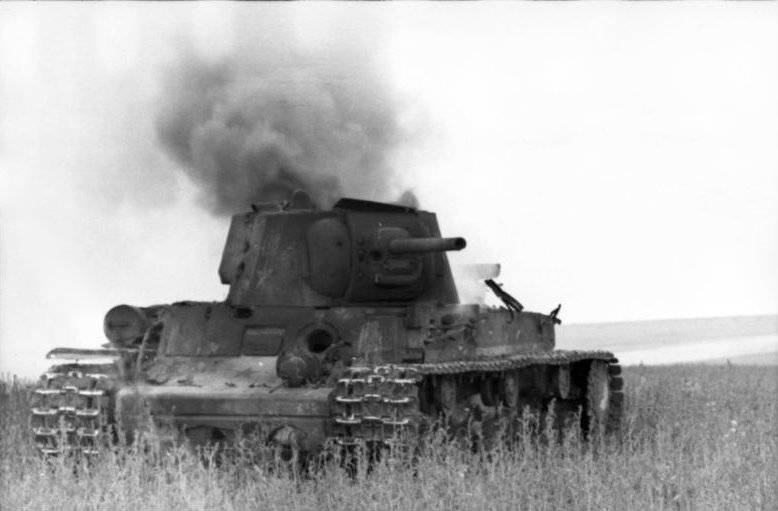
Padded KV-1
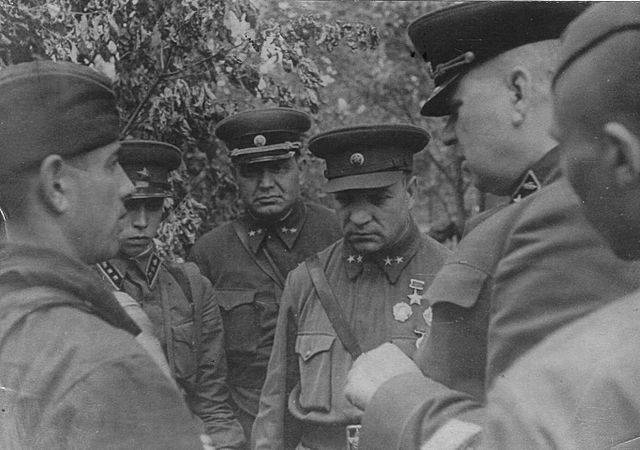
Major General A.I. Lizyukov (center) at a meeting with the officers. Bolshaya Vereika Village, July 1942
Thus, a powerful blow to the flank and rear of the advancing enemy with the aim of disrupting a decisive offensive failed. Due to heavy losses and loss of combat capability, the 5-I tank army was disbanded. However, the 5-I tank army in heavy fighting diverted considerable enemy forces. These few days facilitated the organization of the defense of Voronezh by the forces of the Bryansk Front. The 159-Infantry Division was redeployed near Voronezh. In order to stabilize the situation in the Voronezh direction, the Headquarters decided to divide the Bryansk Front into two separate fronts. Lieutenant-General N. F. Vatutin, deputy chief of the General Staff, became the commander of the troops of the new Voronezh Front. General N. Ye. Chibisov was temporarily appointed commander of the Bryansk Front, then General KK Rokossovsky replaced him.
The troops of the 4 th German tank army of G. Goth advancing on the Voronezh direction reached the headwaters of the Don and broke through to the Voronezh area. Violent battles began outside the city. Halder wrote in his diary from 5 July: “Although at the 3.7 meeting the Führer himself stressed that he didn’t attach any importance to Voronezh and gave the army group the right to refuse to take possession of the city if this could lead to excessive losses, von Bock not only allowed Gota to climb stubbornly to Voronezh, but also supported him in this. " He also noted that the forces of the 24 Tank Division and the Great Germany Division could be seriously depleted when attacking Voronezh, which is well prepared for defense.
The Germans were able to break into the city and capture half of it, but could not build on success. On the bank of the Don, in the area from Zadonsk to Pavlovsk, the defense was occupied by two fresh armies from the reserve of the Supreme Command Headquarters (SVG). At the same time, mobile units of the Bryansk Front, redeployed from the right wing of the front to the area south of Yelets, launched a counterattack on the flank and rear of the German group advancing on the Voronezh direction. The German command was forced to remove the 24 tank corps and three infantry divisions from the direction of the main attack, which turned to the north against the counterattacking Soviet forces. The Soviet troops under the command of Vatutin with stubborn defense and strong counterattacks kept the enemy offensive further. Over the next 10 days, fierce fighting continued in the Voronezh region, but the Germans did not break through any further. In general, the confrontation in the Voronezh region lasted until January 1943. Soviet troops performed an important strategic task: they covered Moscow from the south and held down the forces of the Hungarian army, which replaced the German units. 26 January 1943, the day after the liberation of Voronezh, the following lines appeared in Komsomolskaya Pravda: “Some day many pages will be written about street fighting in Voronezh. This city fought on its squares and streets for months. The city fought for every quarter, a quarter for every home. ”
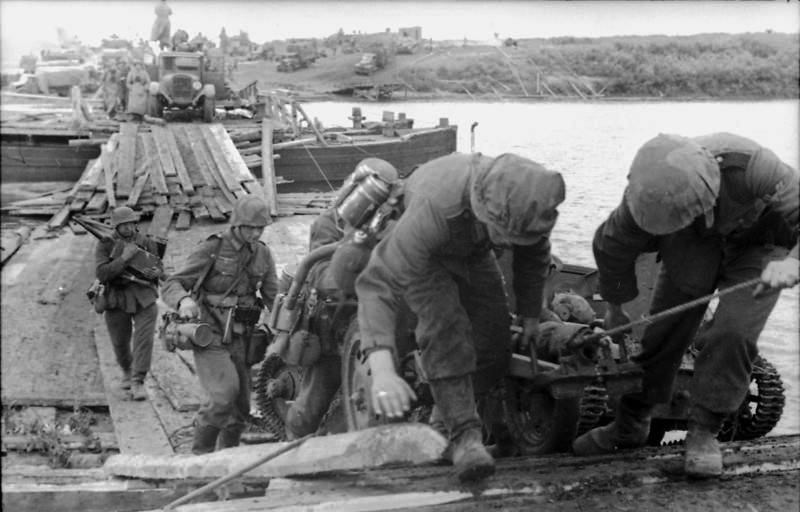
German soldiers force Don near Voronezh. End of June 1942
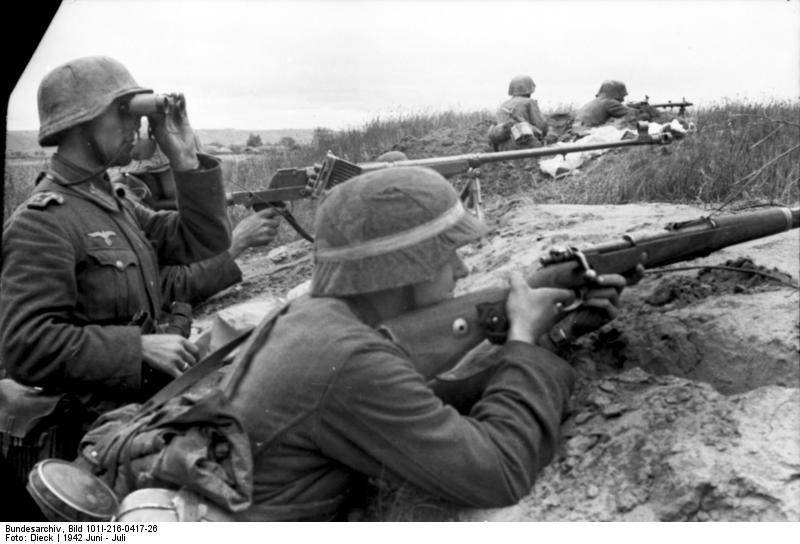
Wehrmacht soldiers in positions near Voronezh
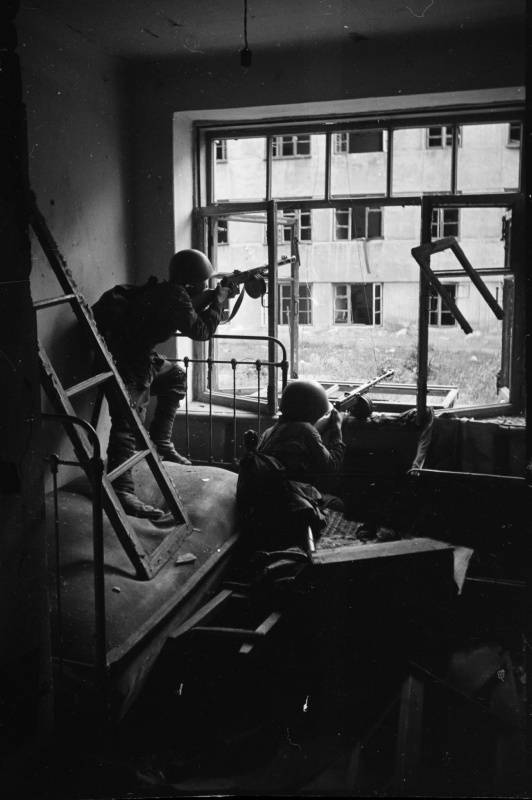
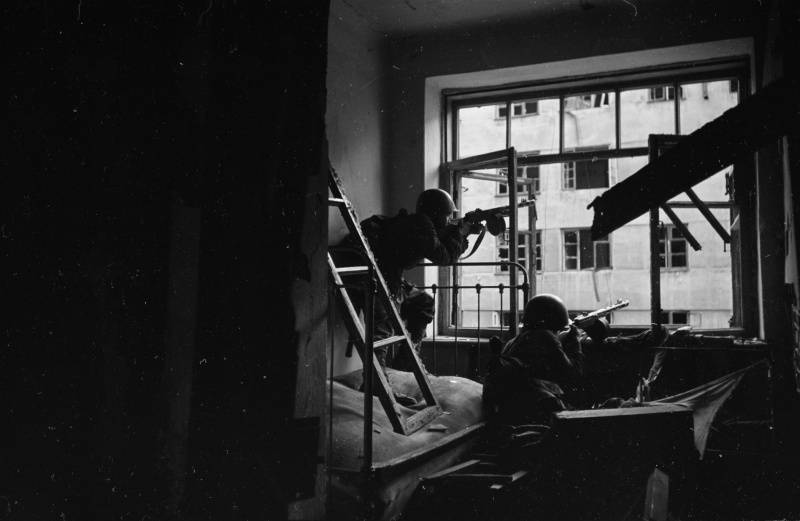
Soviet machine gunners are fighting from the window of a house in Voronezh
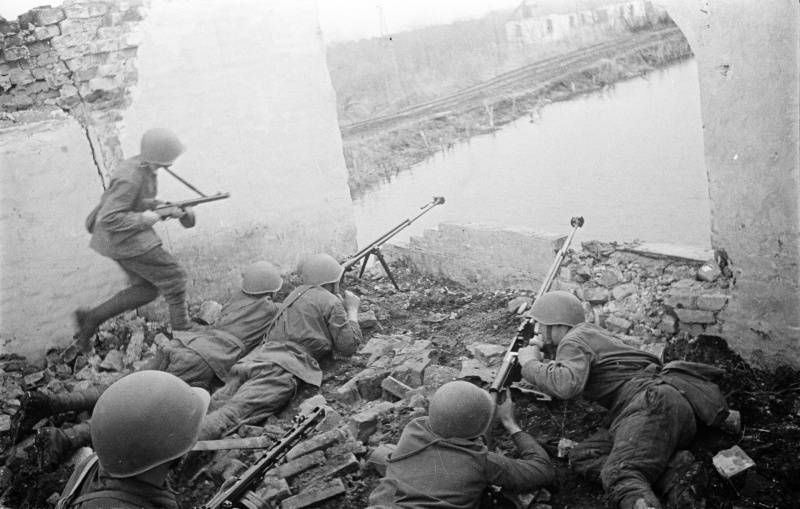
Anti-tank crews armed with self-loading anti-tank guns arr. 1941 of the Simonov system (PTRS-41), in a combat position in a destroyed building, under the cover of machine gunners, during the fighting on the southern outskirts of Voronezh
Thus, in the battle for Voronezh, the German troops could not take up. Meanwhile, the capture of this area was an important part of the overall strategic plan of the Wehrmacht offensive in the 1942 summer campaign. The Germans could not reliably cover the northern flank of the whole Army Group South. Overall, however, the success of the German offensive was obvious. The defense of the Bryansk and Southwestern fronts was broken through up to 300 km and to a depth of 150-170 km. The Wehrmacht reached the Don, forced it west of Voronezh and captured a large part of the city. The German command launched an operation on the encirclement of Soviet troops west of the Don, in front of the front of the 6 Army. Its strike force, coming out on July 5 in the area of Ostrogozhsk, turned south along the right bank of the Don, making a deep detour from the north of the troops of the right wing of the Southwestern Front. A blow from the area south of Voronezh was inflicted by the 4-I tank army of Goth.
The enemy command, leaving its 2 Army near Voronezh, turned the 4 Tank Army in the south-east direction to Kantemirovka. At the same time, the 1 Panzer Army of von Kleist from Army Group A, 8, launched an offensive from Slavyansk, Artyomovsk and Starobelsk, and Kantemirovka in July, delivering a second butt against the South-Western and Southern fronts. By the middle of July, the troops of the 6 and 4 tank armies reached the great bend of the Don and occupied Bokovskaya, Morozovsk, Millerovo, Kantemirovka, and the units of the 1 tank armies reached the Kamensk region. “The battle is unfolding in the south ...” General Halder noted in his diary. - on the western sector (Ruoff of the 17 army) the enemy is still holding, there is little success ... The troops of the 1 and 4 tank armies moving from the north reached the Donets near Kamensk. To the north, the enemy is divided into small groups, which are being destroyed by mobile units advancing from the north in cooperation with infantry divisions. ”
The Germans sought to surround and destroy the troops of the South-Western and Southern fronts. However, they could not. The Soviet Stavka, having unraveled the plans of the enemy, took measures to withdraw the troops from the threat of encirclement. The troops of the South-Western Front, captured by the Germans from the northeast and east, with heavy fighting retreated over the Don to Stalingrad. The troops of the Southern Front retreated from the Donbass to the lower reaches of the Don in order to occupy a defense along its left bank from Upper Kurmoyarsk to Rostov. It was necessary to save the troops in order to organize the defense on the new frontiers. For this it was necessary to gain time by sacrificing the territory.
It was an expedient decision from a military strategic point of view. Russian warriors traditionally, from the time of the Scythian kingdom, skillfully used huge spaces to stretch enemy communications, prevent the enemy from crushing our troops in the first decisive battles, gaining time to regroup, pull up reserves and at the same time exhausting the enemy's forces with rearguard battles. The enemies understood this. K. Tippelskirch noted: “... the new tactics of the Russians, of course, contributed more to the preservation of their forces than the attempt to defend the vast open area between the Sev rivers, as if specially created for tanks. Donets and Don. "
The Germans continued to develop the offensive and achieved great success. Kleist's 1-I tank army from the Millerovo region turned south - towards Novocherkassk. The 17 Army, having launched an offensive from the Stalino area (Donetsk), July 20 occupied Voroshilovgrad with the left flank, and with the center and the right flank it reached the Don on both sides of Rostov. German troops on the broad front forced the Don in its lower reaches and captured Rostov on July 25. “The whole Russian front was falling apart ...”, - this is how the Swedish journalist Arvid Fredborg, who was in Berlin during the war in Berlin, estimated the situation. Victory mood again captured the German elite. It was then that the German High Command decided that the time had come to seize the Caucasus.
23 July 1942, Adolf Hitler signed directive No. 45 on the continuation of the operation, codenamed "Braunschweig." Army Group "A" received the task of attacking the Caucasus, and the entire 4-I tank army was transferred to its structure. Army Group "B" forces 6-th army had to take Stalingrad. The Directive, in more detail than before, defined the task of seizing Stalingrad and the Caucasus. On the other hand, it was obvious that the German command, after overestimating the successes achieved, believed that favorable conditions had appeared for a simultaneous attack on Stalingrad and the Caucasus.
The German headquarters attached great importance to actions in the Caucasus, a breakthrough to Baku. September 18 1942. Hitler told General Field Marshal Keitel: “The breakthrough to Tuapse and then the blocking of the Georgian Military Highway and the breakthrough to the Caspian Sea are crucial,” he said. Thus, the German High Command decided to advance in two directions: at Stalingrad-Astrakhan and the Caucasus. The main forces were aimed at the Caucasus. To solve the problem of conquering the Caucasus, the 1 and 4 tank, 17 and part of the forces of the 11 field armies were distinguished. The Germans believed that Stalingrad and Astrakhan would be captured by the forces of the same 6 Army even before the withdrawal of the Army Group A troops to the Main Caucasian Ridge. The operations to seize Stalingrad initially attached auxiliary importance; the 6 Army was to provide the northern flank of the attack force, which was advancing on the Caucasus. As a result, the enemy once again underestimated the power of the Red Army and the USSR.
The commander of Army Group South, and then Group B, Fyodor von Bock criticized the fragmentation of Army Group South to the Stalingrad and Caucasus sectors during the summer offensive. 15 July 1942 Field Marshal von Bock was removed from command of Army Group South (the official wording was due to illness) and sent to the Fuhrer reserve. As a result, one of the leading commanders of the Third Reich remained inactive until the end of the war.
True, simultaneously with the development of the offensive on Stalingrad and the Caucasus, the German command decided to tie down Soviet troops in other sectors of the front, to deprive the Red Army of the possibility of maneuvering reserves. To this end, it was planned to conduct a series of offensive operations by part of the forces of the Army Groups North and Center. Army Group "North" in September was to conduct an operation to capture Leningrad. To reinforce this group of troops, it was decided to transfer the main forces of the 11 Army from the Crimea, although they had previously planned to use them in the Caucasus. The general leadership of the operation to seize Leningrad was entrusted to the commander of the German army 11, Manstein. 24 August 1942, at a special meeting with Hitler, he received an order: "The immediate task is to surround Leningrad and establish contact with the Finns, the next task is to seize Leningrad and level it to the ground." Also planned to seize the Murmansk railway.
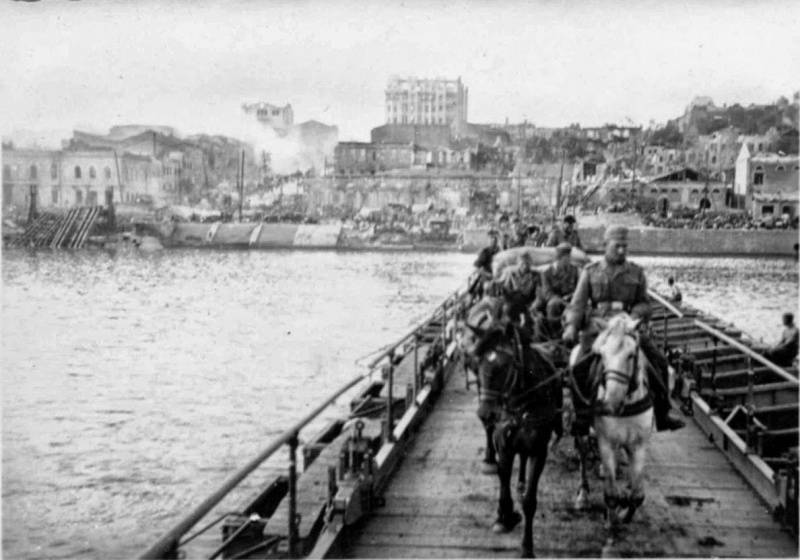
Germans are ferried across the Don in the center of the occupied Rostov-on-Don
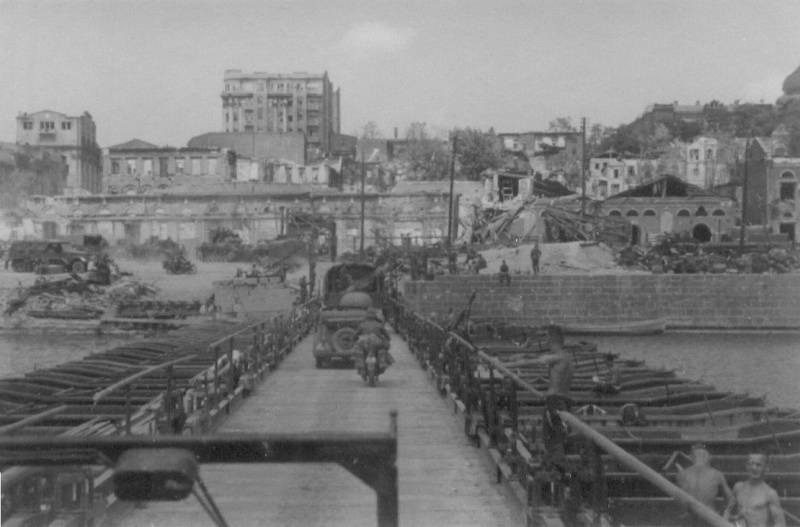
German-induced pontoon ferry in the center of Rostov-on-Don
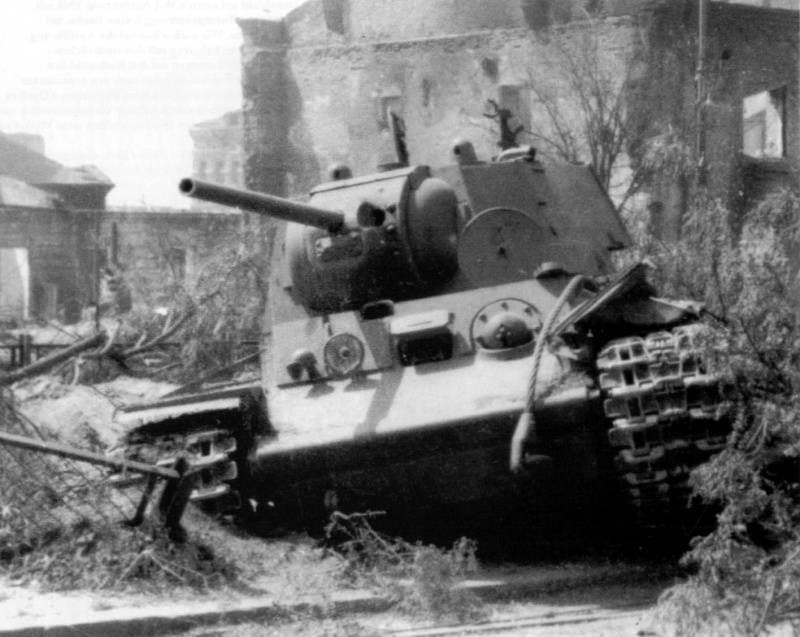
Tank KV-1 on the market square of Rostov-on-Don. The 1941 model car of the year has a reinforced welded turret of late production series with the 76,2-mm ZIS-5 gun
Results
In the spring and early summer of 1942, the martial law of the USSR deteriorated sharply again. An attempt to break through the blockade of Leningrad with the joint efforts of the Leningrad and Volkhov fronts ended in failure. In the course of the Luban operation, surrounded by the main forces of the 2 th shock army. Our troops suffered heavy casualties, many soldiers died, went missing or were captured. Leningrad still remained in the blockade ring. The second capital of the USSR was bombed, shelled, people were dying of hunger and cold. Demyanskaya operation of the North-Western Front also did not lead to success. In the Moscow sector, an important operational strategic base (Vyazma region) was lost in the rear of Army Group Center.
But the most dangerous situation was on the southern flank of the front. German troops seized a strategic initiative. At the front in 600-650 km between Taganrog and Kursk, the Wehrmacht broke through the Soviet front and quickly developed the offensive, trying to surround and destroy the Soviet troops in parts. Under the powerful onslaught of the enemy, who had a great advantage in tanks, aircraft and artillery in the direction of the main attacks, and still maintained superiority in combat skills, the troops of the Bryansk, South-Western and Southern fronts retreated from 28 June to 24 July to 150-400 km. However, the German troops could not surround and destroy the Soviet troops west of the Don. The Red Army conducted heavy defensive battles, counterattacked, was forced to retreat, and with its stubborn resistance disrupted the plans of the enemy.
The German stake once again overestimated its strength and underestimated the enemy. Hitler believed that the main tasks of defeating the southern wing of the Red Army were resolved, that only small Soviet forces were able to escape from the encirclement, so you can throw the main forces on the storming of the Caucasus. The cruel enemy attacked, seized vast territories with a large population and material resources. In the USSR, the second wave of evacuation took place: millions of people, huge material assets moved to the east of the country. However, the Soviet Union had a moral and material advantage over a strong enemy, and it gradually began to affect the course of the war.
In such a difficult situation, two great battles of the Great War began: the Battle of Stalingrad and the Battle of the Caucasus. They largely predetermined the entire subsequent course of the Second World War.
To be continued ...
Application. Directive No. 45. On the continuation of the operation "Braunschweig"
During the campaign, which lasted less than three weeks, the big tasks that I set for the southern wing of the Eastern Front were mostly fulfilled. Only small forces of Tymoshenko’s armies managed to escape from encirclement and reach the southern coast of the r. Don. It should be borne in mind that they will be strengthened by the troops stationed in the Caucasus.
There is a concentration of another enemy grouping in the area of Stalingrad, which he, apparently, is going to defend.
Ii. Tasks for further operations
A. Ground Forces
1. The immediate task of Army Group "A" is to encircle and destroy the enemy forces that left the river. Don, in the area to the south and south-east of Rostov.
To do this, launch large forces of tank and motorized troops from bridgeheads in the Konstantinovskaya and Tsimlyanskaya areas, which must be captured by our troops in advance, in the general direction to the south-west, approximately at Tikhoretsk, and force infantry, chasseurs and mountain divisions to force the Don in the area Rostov
Along with this, the task of the advanced units to straddle the Tikhoretsk-Stalingrad railway remains in force.
Two tank units of Army Group A (including 23 and 24 tank divisions) should be transferred to Army Group B to continue operations in the southeast direction.
The "Great Germany" infantry division should be left in the OKH reserve in the area north of the Don. Prepare to send it to the Western Front.
2. After the destruction of the enemy groupings south of the river. The most important task of Army Group A is to capture the entire eastern coast of the Black Sea, as a result of which the enemy will lose the Black Sea ports and the Black Sea Fleet.
To do this, transfer the 11 Army units (the Romanian mountain corps) intended for this task through the Kerch Strait, as soon as the advancement of the main forces of Army Group A is indicated, in order to then strike along the road running along the Black Sea coast to the southeast .
The other group, which will include all the other mountain divisions and chasseurs divisions, has the task to force the r. Kuban and seize the sublime terrain in the area of Maikop and Armavir.
In the course of further advancement of this grouping, which must be promptly strengthened by mountain parts, all its passes will be used in the direction of the Caucasus and through its western part. The task is to engage the forces of the 11 Army in order to capture the Black Sea coast.
3. At the same time, the grouping, which mainly includes tank and motorized formations, singling out part of the forces to secure the flank and pushing them eastward, should seize the Grozny region and part of the forces to cut the Military Ossetian and Georgian Military roads as far as possible on the passes. In conclusion, take a blow along the Caspian Sea to seize the Baku area.
Army Group "A" will be given the Italian Alpine Corps. For these operations, Army Group "A" introduces the coded name "Edelweiss". Security level: Top secret. Only for command.
4. The group of armies "B", as was ordered earlier, falls to the task, along with the equipment of defensive positions on the r. Don strike at Stalingrad and defeat the enemy grouping that was concentrated there, seize the city, and also cut the isthmus between the Don and the Volga and disrupt transportation along the river.
Following this, tank and motorized troops must strike along the Volga with the task of reaching Astrakhan and there also paralyze traffic on the main riverbed of the Volga.
These operations of Army Group B are coded with the name “Fishreier.” Security level: Top secret. Only for command.
B. Aviation
The task of aviation is to first provide large forces with a ferry across the Don, then provide support to the eastern group advancing along the railroad to Tikhoretsk. After that, its main forces should be concentrated to destroy the armies of Tymoshenko. Along with this, it is necessary to render assistance to the offensive of Army Group “B” on Stalingrad and Astrakhan. Of particular importance is the timely destruction of the city of Stalingrad. In addition, one should occasionally raid Astrakhan; the movement of vessels in the lower Volga should be paralyzed by dropping mines.
During the further deployment of operations, the main task of aviation is to interact with troops advancing to the ports of the Black Sea, and, in addition to directly supporting ground forces, it is necessary to prevent the influence of the naval forces of the enemy on the advancing troops, while interacting with the navy.
Further, it is necessary to allocate a sufficient number of forces to interact with the troops striking through Grozny on Baku.
In connection with the decisive importance that the oil industry of the Caucasus has to continue the war, aviation attacks on oil fields and large oil storages, as well as transshipment ports on the Black Sea, are allowed only when it is absolutely necessary for land forces operations. However, in order to deprive the enemy of the possibility of delivering oil from the Caucasus in the near future, it is necessary to destroy the railways used for this purpose, as well as to paralyze transportation through the Caspian Sea.
B. Navy
The task of the Navy, along with the direct support of the ground forces when crossing the Kerch Strait with the forces available in the Black Sea, prevents the enemy from affecting the troops operating on the Black Sea coast from the sea.
To facilitate the supply of ground forces, as soon as possible, transfer several sea ferries across the Strait of Kerch to the Don River.
The headquarters of the naval forces, in addition, take the necessary measures to use light ships of the naval forces in the Caspian Sea to act on the enemy’s sea lanes (transports with oil and communication with the Anglo-Saxons in Iran).
III.
The operations, to which preparations are now being conducted on sections of the front of the Army Groups Center and North, must be carried out quickly one after another. In this way, the dismemberment of the enemy forces and the fall in the morale of its commanding staff and troops will be largely ensured.
Army Group North to the beginning of September to prepare the seizure of Leningrad. The operation receives the code name "Foyertsauber." To do this, transfer to the army group five divisions of the 11 Army, along with heavy artillery and special power artillery, as well as other necessary units of the reserve of the main command.
Two German and two Romanian divisions temporarily remain in the Crimea; The 22 Division, as previously ordered, is sent to the commander of the forces of the south-east.
IV.
When developing plans on the basis of this directive and its transfer to other instances, as well as issuing orders and instructions related to it, follow my order from 12.7 on keeping secrets.
Adolf Gitler
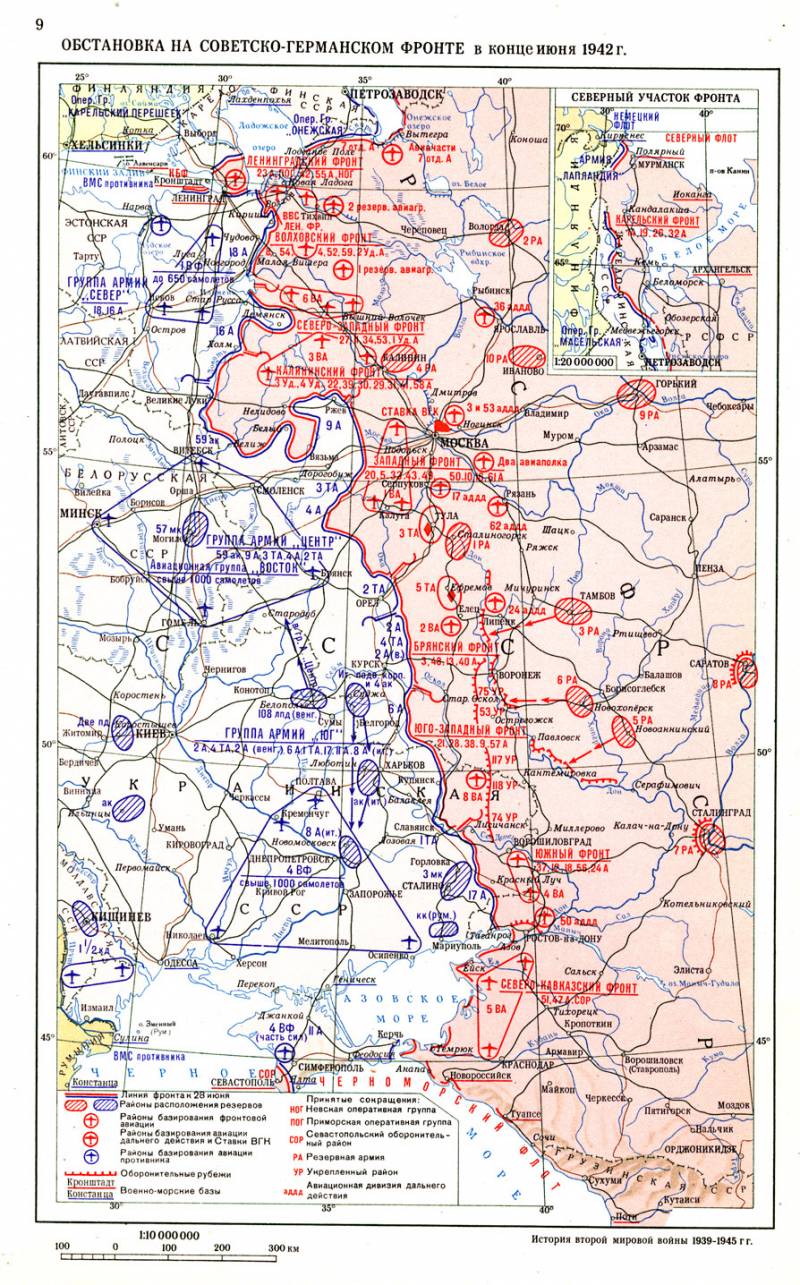
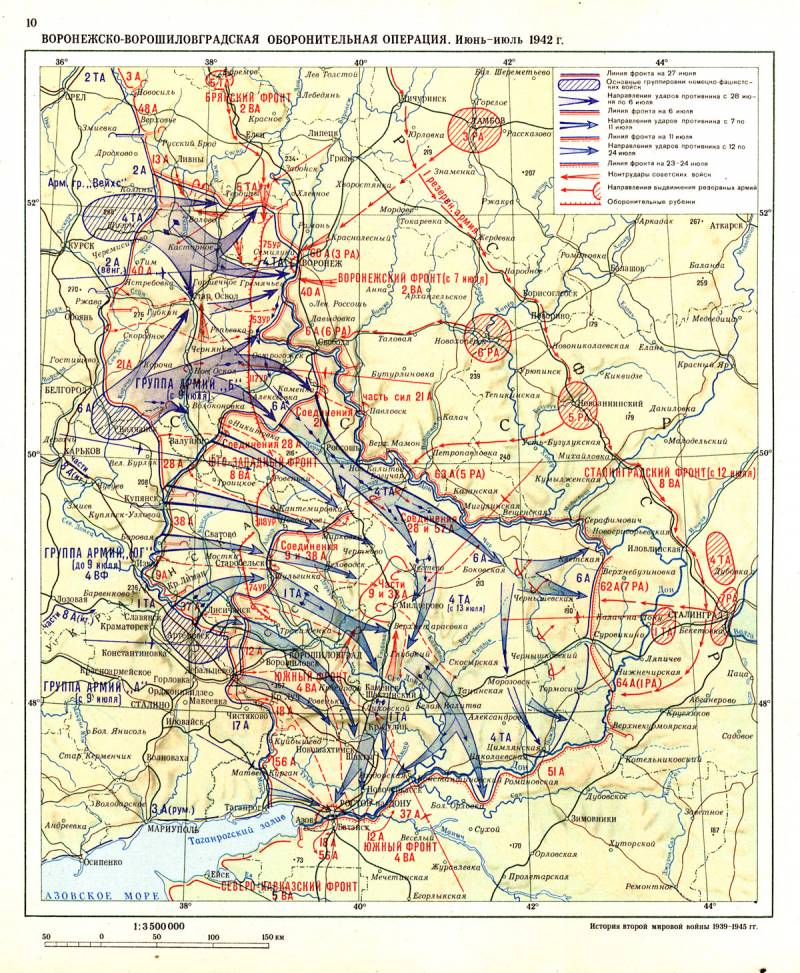
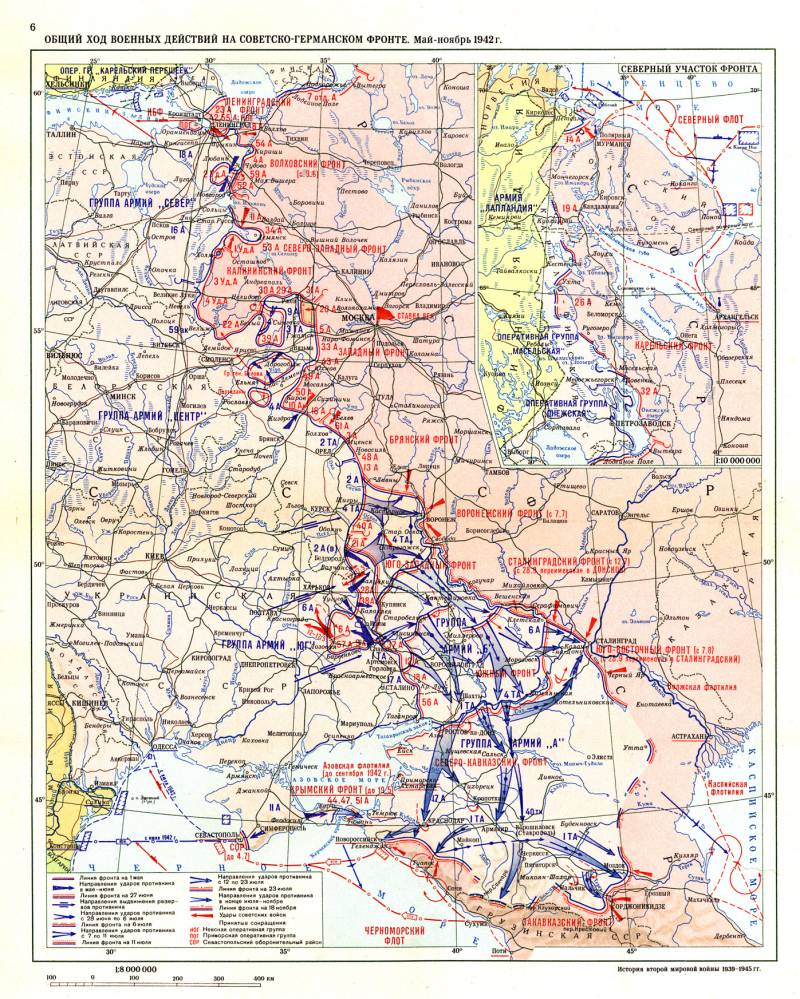
Information